J. Bradford DeLong's Blog, page 2113
January 24, 2011
IAS 107: 20110125 Lecture: Introduction to Economic Growth
Why Oh Why Can't We Have a Better Press Corps?
Has anybody ever seen a more diabetic coma-inducing beat sweetener than this, from Peter Baker of the New York Times?
Peter Baker:
The selection of [Gene] Sperling, who held the same job under Clinton [as Larry Summers's replacement], was telling. A onetime boy wonder who, despite his graying hair, still has the same whirling-dervish, work-till-midnight energy, Sperling... passed over for other prominent jobs... bided his time as a counselor to Geithner, and eventually won over Obama with his doggedness. As a champion of the payroll tax holiday, he proved critical to shaping Obama’s tax deal with Republicans and so many other issues that White House officials refer to him as B.O.G., the Bureau of Gene. Where Summers was a master macroeconomic thinker, Sperling is known for his mastery of getting things done, or at least waging the fight, in the place where policy, politics and media meet...
If anyone knows of any more fulsome, cloying, and extravagant praise by a reporter of a hoped-for future source, I'd love to see it in the comments...



January 23, 2011
Hoisted from Comments: More Thoughts on the Repeal-and-Replace the Affordable Care Act Crowd...
James Wimberly
The Remarkable Spectacle of the Repeal-and-Replace the Affordable Care Act Crowd...: Look at the amicus brief of a far more reputable gaggle of economists in the Florida individual mandate case:
It really is no contest on the quality of argumentation.
BTW, the case for ACA as near to the best feasible reform was abundantly made at the time. Standing laws don't need continuous fresh defences. It's up to the repeal-and-a-pony crowd to make their case, and there isn't one.
Indeed:
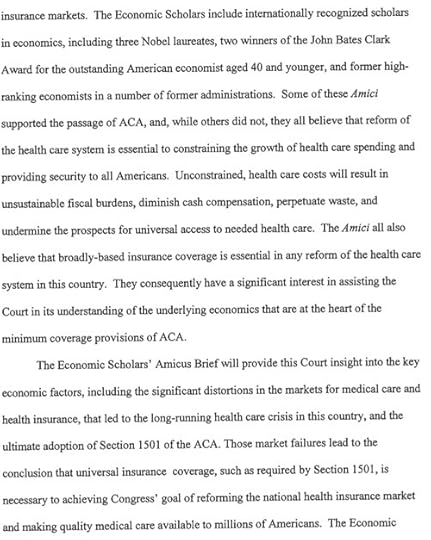
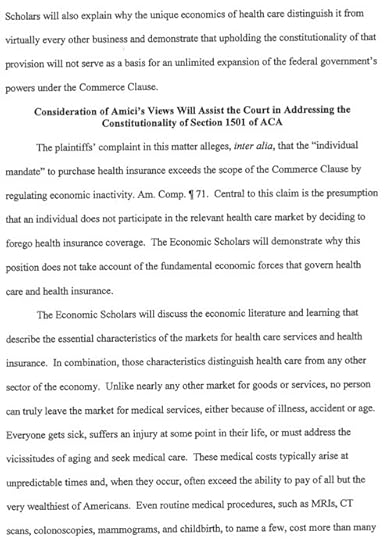
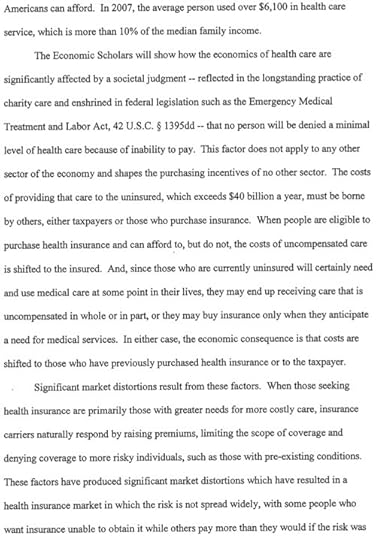
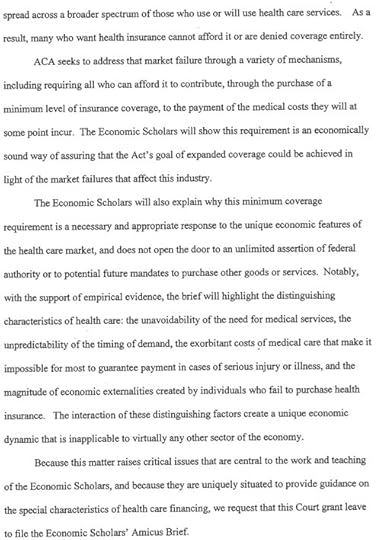



Invisible Campaign
Josh Marshall:
Invisible Campaign: I saw the news on Friday that former House Speaker Newt Gingrich will base his presidential campaign in Georgia. Isn't this like my telling you that my imaginary friend is quitting the venture capital business and becoming a folk singer? Interesting news but somehow the premise is more telling than the news itself.
Can Gingrich still raise any money?



Holy Fracking Climate Frack!!
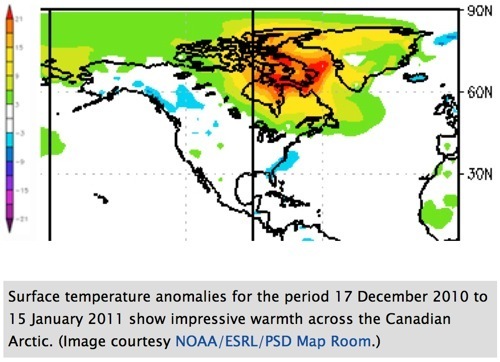
Now that's a positive temperature anomaly!
Bob Henson:
Cold comfort: Canada's record-smashing mildness: Some fascinating weather has unfolded across the Northern Hemisphere over the last month... heavy snow that battered the mid-Atlantic and New England states in late December... the United Kingdom’s coldest December in at least the last century. Meanwhile, the sparsely populated Canadian Arctic basked in near-unprecedented mildness.
It’s the second chapter of a tale that began a year ago, when Canada as a whole saw the warmest and driest winter in its history. Much of the blame went to El Niño, which typically produces warmer-than-average weather across Canada. So far, so good—but similar things are happening this winter, even with a La Niña now at the helm.
Just how mild has it been? The map at right shows departures from average surface temperatures for the period from 17 December 2010 to 15 January 2011, as calculated by NOAA’s Earth Systems Research Laboratory. The blue blip along the southeast U.S. coast indicates readings between 3°C and 6°C (5.4–10.8°F) below average for the 30-day period as a whole. That’s noteworthy—and in fact, it was the coldest December in more than a century of record-keeping across south Florida.... Blue also shows up across the UK, where December averaged 5.2°C (9.4°F) below normal.
What really jumps out, though, is a blob of green, yellow, orange, and red covering a major swath of northern and eastern Canada. The largest anomalies here exceed 21°C (37.8°F) above average, which are very large values to be sustained for an entire month.
To put this picture into even sharper focus, let’s take a look at Coral Harbour, located at the northwest corner of Hudson Bay in the province of Nunavut. On a typical mid-January day, the town drops to a low of –34°C (–29.2°F) and reaches a high of just -26°C (–14.8°F). Compare that to what Coral Harbour actually experienced in the first twelve days of January 2011.... After New Year’s Day, the town went 11 days without getting down to its average daily high. On the 6th of the month, the low temperature was –3.7°C (25.3°F). That’s a remarkable 30°C (54°F) above average. On both the 5th and 6th, Coral Harbor inched above the freezing mark. Before this year, temperatures above 0°C (32°F) had never been recorded in the entire three months of January, February, and March....
In mid-December, a vast bubble of high pressure formed in the vicinity of Greenland. At the center of this high, the 500-mb surface rose to more than 5.8 kilometers, a sign of remarkably mild air below. Stu Ostro (The Weather Channel) found that this was the most extreme 500-mb anomaly anywhere on the planet in weather analyses dating back to 1948.... Farther west, a separate monster high developed over Alaska last week....

Why so freakishly mild? One factor that both feeds and is fed by the warmth is the highly unusual amount of open water across seas that are normally frozen by late November. On the winter solstice (December 21), Hudson Bay was little more than half frozen... the Baffin/Newfoundland Sea fell weeks behind schedule in freezing up. As evident in the charts at bottom, these bodies of water remain in catch-up mode....
The extraordinary Arctic warmth and the midlatitude chill and snow bear the fingerprints of a negative North Atlantic Oscillation (NAO), the pattern that prevailed for much of last winter as well. As opposed to a positive NAO, where the jet stream whisks mild air across the Atlantic, a negative NAO—which has predominated since October—features a blocked-up jet stream that allows cold air to plunge more easily southward and mild air to take hold in the Arctic. It seems plausible that the open water between Greenland and Canada has played a role in the record warmth observed at the surface and aloft and the associated negative NAO. However, the NAO’s causes remain mysterious, and its future is impossible to predict...



Brian Beutler on the Intellectual and Moral Collapse of the Republican Party...
We are unlikely to ever get a health-care system with rational financing until everybody's care is paid for by some mechanism--rather than being paid for under the heading of somebody else's insurance via cost shifting. We are unlikely to have a society we can be proud of until everyone can get easy access to preventive, acute, and chronic medical care. For both intellectual and moral reasons a health care system that does not provide universal coverage is likely to be a lousy one.
The Republican Party agreed with this up until mid 2009. Now it doesn't.
Brian Beutler watches the train wreck:
How The Health Care Repeal Push Marks The End Of The Universal Health Care Consensus: Here's one case for the individual mandate in the health care law boiled down to two sentences -- both fairly elegant considering they were spoken extemporaneously.
There isn't anything wrong with it, except some people look at it as an infringement upon individual freedom. But when it comes to states requiring it for automobile insurance, the principle then ought to lie the same way for health insurance, because everybody has some health insurance costs, and if you aren't insured, there's no free lunch. Somebody else is paying for it." -- June 14, 2009....
[T]he individual mandate actually marries two distinctly American priorities -- an obsession with private markets, and the core belief that nobody should go without health care.
Considering just how cacophonous the health care debate has become, it might surprise you to learn that the mystery reformer quoted above is Sen. Chuck Grassley (R-IA), the Republicans' health care point man in the Senate who, during the same interview, with great authority, claimed "I believe that there is a bipartisan consensus to have individual mandates."
Two months later he threw in his lot with Sarah Palin (R-AK) and the Death Panelers. Now he claims -- along with about half the attorneys general in the country -- that the individual mandate is unconstitutional and, like the rest of the GOP, uses it as the foundation for a far-reaching political assault on the health care law....
Grassley's violent lurch to the right wasn't idiosyncratic. It was the consequence of a deliberate Republican political strategy.... What was once a popular, if not consensus, policy framework on the right -- authored by personal-responsibility conservatives and popularized by John Chafee, Bob Dole, and Mitt Romney -- rapidly became kryptonite for Republican politicians. As a result, for the first time in more than a half century, there is one political party in the country that has zero high-profile advocates for a forgotten goal: that somehow, some way, every citizen deserves proper health care.
And yet they can't quite bring themselves to say that....
Now that Republicans control the House of Representatives, their fusillade against the health care law has actual legislative ammunition. But the question of what they'd replace it with is still open. "We'll let the committees do their work on how we should replace this, and what the common sense reforms will be. They'll have hearings. It'll be a bipartisan process," said House Speaker John Boehner (R-OH). We'll see what they come back with."
What they came up with last time around -- their alternative to the Affordable Care Act -- was a grab bag of industry-friendly and anti-federalist ideas: malpractice reform, allowing people to buy insurance across state lines. The outcome, according to congressional actuaries, would be roughly no decrease in the number of uninsured people, when you adjust for population growth. "By 2019, CBO and JCT estimate, the number of nonelderly people without health insurance would be reduced by about 3 million relative to current law, leaving about 52 million nonelderly residents uninsured. The share of legal nonelderly residents with insurance coverage in 2019 would be about 83 percent, roughly in line with the current share"...



Mark Thoma Has a Forecst of Obama's State of the Union Address
Mark Thoma:
Economist's View: SOTU: Obama's Focus on Jobs: This is a year too late, more than that actually, but President Obama's intent to focus on jobs in the State of the Union address is welcome. The abandonment of the recommendations of the bipartisan majority on the debt-reduction commission -- for now anyway -- is also good news. This committee appeared to have Social Security in its sights mostly for ideological reasons rather than as something that would make a meaningful dent in the budget problem...
What puzzles me is what a "focus on jobs" means. At one level, it means neoliberal Democratic business as usual: most of our policies are, after all, aimed at raising the productivity of and the demand for labor. But "focus on jobs" implies policies that the executive branch can do on its own or persuade congress to pass that will have a large bang, and it is not clear to me what the White House thinks those are.



Matthew Yglesias Watches Douglas Holtz-Eakin Continue to Set His Own Credibility on Fire
Matthew Yglesias:
Yglesias » Is Repealing the Affordable Care Act Secretly About Replacing It With a Different Secret Law?: In a word: No. But don’t tell wonk-turned-hack Douglas Holtz-Eakin who explains:
Replacing PPACA with real health-care reform that delivers quality care at lower costs. That is what the repeal vote is really about.
I always forget if I’m allowed to use the word “bullshit” on an official CAPAF website (that was a mention—thanks Professor Goldfarb!), but I think this is best analogized to the solid waste of a male bovine. This just isn’t how public policy works. We change (or “replace”) laws all the time, and it doesn’t happen by first repealing predecessor laws tout court and then gesturing vaguely at a replacement. My guess is that Holtz-Eakin has a bunch of ideas about ways to improve health care policy in the United States relative to the post-ACA status quo. My guess is that I even agree with some of those ideas. The way to get those ideas enacted is to start explaining them to the press and the public and start talking to members of congress about turning them into bills.
At this point I’m not actually sure what the repeal vote is “really” about, but it’s definitely not about starting concrete conversations about further changes to the American health care system.



Liveblogging World War II: January 23, 1941
Operation Compass: General O'Conner's command captures Tobruk in Libya:
Brits and Australians take Tobruk: the British 7th Royal Tank Regiment drove westward from Bardia, which it had just taken from the Italians, with the intention of isolating Tobruk until the 6th Australian Division could aid in an assault. The attack on the coastal fortress of Tobruk was finally launched on the 21st and it fell the next day, yielding 30,000 Italian prisoners, 236 guns, and 87 tanks.



January 22, 2011
The Remarkable Spectacle of the Repeal-and-Replace the Affordable Care Act Crowd...
Andrew Sabl:
Two hundred economists (and nothin’ on): A few days ago, Politico Pulse (can’t find a permalink, but here’s where The Weekly Standard’s blog reprinted the story) published an item saying:
House Republicans open the health reform repeal debate today with an ace up their sleeves: a letter making the economic case for repealing the law, signed by 168 tenured economics professors and academic institution-affiliated scholars, two former CBO directors and four Federal Reserve economists, including a Nobel Laureate, among others.
"We believe the Patient Protection and Affordable Care Act is a threat to U.S. businesses and will place a crushing debt burden on future generations of Americans," the 200 economists write, in a letter organized by the American Action Forum and obtained by PULSE. They charge that the law is a barrier to job growth and a "massive spending increase" adding $1 trillion in government spending over the next decade.
Here's the (rather overheated) letter. Conveniently, it was followed a couple of days later by a crowd-sourced rating of top economics departments.... Of the 200 or so economists signing the letter, the number who teach at the top ten departments is four: Michael Boskin from Stanford... Robert Lucas from Chicago... and two from Columbia. We'll add the Nobel Laureate.... That makes five out of two hundred from top ten departments or the equivalent. On the other hand, Hillsdale College is well represented (four signers), as are conservative think tanks....
A letter like this is a political exercise, and the currency of politics is reputation. Whoever circulated the letter knew full well that the more famous economists from prestigious departments who signed it, the more impact it would have among people who actually care what experts think. And this is the best they could do...
Indeed. They also couldn't get even 200 to sign on for "repeal"--all they would sign on to is "repeal-and-replace." And they couldn't get 200 to sign on to any specific replacement: just a vague fuzzy generic "replace."



J. Bradford DeLong's Blog
- J. Bradford DeLong's profile
- 90 followers




